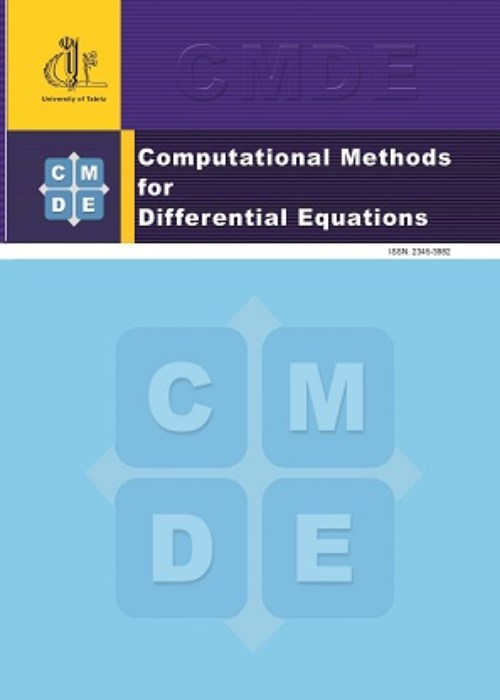فهرست مطالب
Computational Methods for Differential Equations
Volume:3 Issue: 4, Autumn 2015
- تاریخ انتشار: 1394/07/09
- تعداد عناوین: 6
-
-
Pages 231-246In this work, a new iterative method is proposed for obtaining the approximate solution of a class of Hammerstein type Integral Equations System. The main structure of this method is based on the Richardson iterative method for solving an algebraic linear system of equations. Some conditions for existence and unique solution of this type equations are imposed. Convergence analysis and error bound estimation of the new iterative method are also discussed. Finally, some numerical examples are given to compare the performance of the proposed method with the existing methods.Keywords: Iterative method, Nonlinear integral equations system, Hammerstein integral equation, Fixed point iteration, Contraction operator
-
Pages 247-257
We present a collocation method to obtain the approximate solution of Troesch's problem which arises in the confinement of a plasma column by radiation pressure and applied physics. By using the Christov rational functions and collocation points, this method transforms Troesch's problem into a system of nonlinear algebraic equations. The rate of convergence is shown to be exponential. The numerical results obtained by the present method compares favorably with those obtained by various methods earlier in the literature.
Keywords: Troesch's problem, Christov functions, Collocation, Wiener functions -
Pages 258-273This study develops and analyzes preconditioned Krylov subspace methods to solve linear systems arising from discretization of the time-independent space-fractional models. First, we apply shifted Grunwald formulas to obtain a stable finite difference approximation to fractional advection-diffusion equations. Then, we employee two preconditioned iterative methods, namely, the preconditioned generalized minimal residual (preconditioned GMRES) method and the preconditioned conjugate gradient for normal residual( preconditioned CGN) method, to solve the corresponding discritized systems. We further make comparisons between the preconditioners commonly used in the parallelization of the preconditioned Krylov subspace methods. The results suggest that preconditioning technique is a promising candidate for solving large-scale linear systems arising from fractional models.Keywords: Krylov subspace methods, . Preconditioning techniques, Fractional model
-
Pages 274-283
In this paper, a finite-time control scheme is presented for stabilization of the satellite chaotic attitude around its equilibrium point when its attitude is confused by a disturbed torque. Controllers and settling time of stabilizaton are obtained, based on the Lyapunov stability theorem and finite-time control scheme. This method is satisfied for any initial condition. Numerical simulations are presented to illustrate the ability and effectiveness of proposed method.
Keywords: Finite-time stabilization, quaternion, satellite attitude -
Pages 284-297
The purpose of this study is to present an approximate numerical method for solving high order linear Fredholm-Volterra integro-differential equations in terms of rational Chebyshev functions under the mixed conditions. The method is based on the approximation by the truncated rational Chebyshev series. Finally, the effectiveness of the method is illustrated in several numerical examples. The proposed method is numerically compared with others existing methods where it maintains better accuracy.
Keywords: Rational Chebyshev functions, Fredholm-Volterra integro-differential equations, Collocation method -
Pages 298-310In this paper, installment options on the underlying asset which evolves according to Black-Scholes model and pays constant dividend to its owner will be considered. Applying arbitrage pricing theory, the non-homogeneous parabolic partial differential equation governing the value of installment option is derived. Then, penalty method is used to value the European continuous installment call option.Keywords: Installment option, Black-Scholes model, penalty method, Free boundary problem


